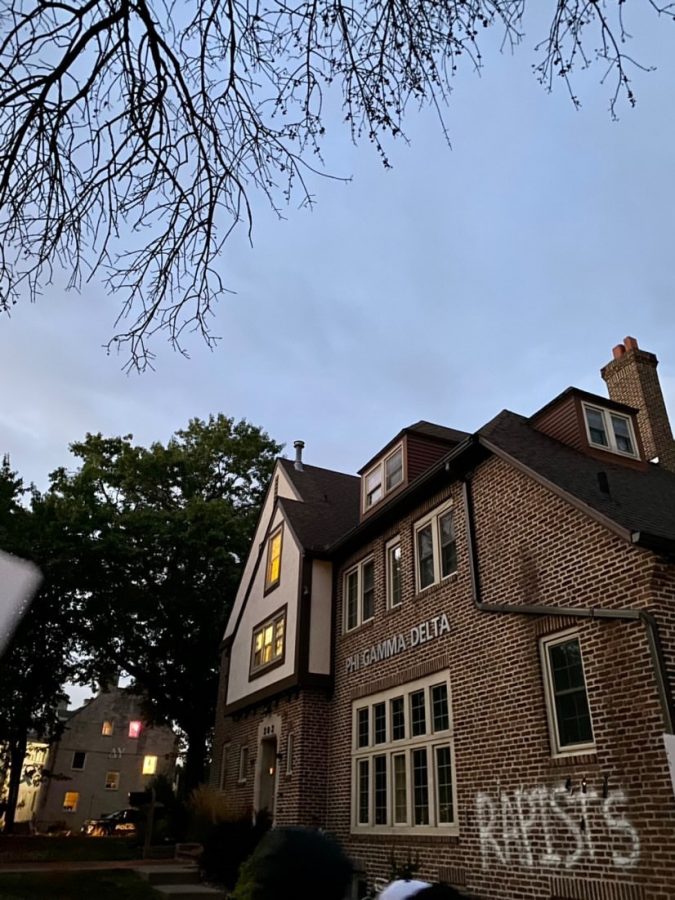The first few weeks of college, a time meant for exploration and adventure, mean something different for most young women: learning to adapt to the new dangers of living independently.
On Aug. 23, a sexual assault was reported at the Fiji fraternity house at the University of Nebraska-Lincoln. This caused a national outrage that sparked change at the University of Iowa.
Sexual assault and rape are not new issues surrounding Greek life, especially the fraternity of Phi Gamma Delta, also known as Fiji. The days of protests at the University of Nebraska helped bring to surface the perennial sexual assault allegations against members of University of Iowa’s chapter of Fiji.
In September of 2020, the Iowa City police department received a report of a rape that took place at the Fiji fraternity house on campus. After this night, there were rumors of a video displaying the two men accused of having sex with the victim floating around a GroupMe chat including all members of the fraternity. The men in question were supposedly told to get rid of all the evidence and videos that could potentially connect them to the sexual assault.
The lack of response and criminal charges over the past year has angered students, as they believe the men involved should be held accountable.
A year later and with no charges filed, over 2,000 students gathered to protest outside of the chapter of Phi Gamma Delta at the University of Iowa on Aug. 31. Lining the sidewalks, protesters held signs and yelled chants such as “F— Fiji” and “Protect our girls.” These protesters demanded change as well as for the Fiji chapter to be expelled from the University’s Greek system.
Although the gathering was intended to be peaceful, anger fueled some to approach the house, throw rocks and eggs, break windows and graffiti the house. Many students stayed all night until their voices became hoarse to get their point across. In the morning, the yard of the house was littered with protest signs from the night before.
But college women are not the only ones to endure sexual assault. One 15-year-old girl, choosing to remain anonymous, detailed her experience of rape from when she was only 12 years old.
While attending a Halloween costume party, she asked for directions to the bathroom and instead was directed towards a bedroom where two teen boys awaited her arrival. There, she found herself helpless and alone.
It did not take long for these boys to take turns raping her.
“I didn’t tell anyone for almost four years. I was scared no one would believe me,” she said as she recounted that traumatic night. She is not the only young girl afraid to tell her story, as rape in high schools has often become an unspeakable and censored topic. She continued, “Sexual assault is never spoken about; its super taboo.”
As a high schooler, she was never informed about how common sexual assault and rape are during middle school and high school. The media tends to bolster these allegations at universities but ignores them for younger women. Everyone is familiar with sexual assault–whether it is by hearing about it, seeing it or experiencing it–the issue seems to fall between the cracks when it comes to high school students.
The National Sexual Violence Resource Center conducted a research study in which data was found that “[o]ne in five women in the United States experienced completed or attempted rape during their lifetime” and “[o]ne in three female victims of completed or attempted rape experienced it for the first time between the ages of 11 and 17.”
The women who were raped at the various Fiji houses across the country bravely spoke out and created a chain reaction that is slowly starting to inspire more women to speak on their experiences.
As college-aged victims have become more bold and comfortable with speaking out about their experiences, it is likely that this trend will expand into high school to inspire more victims and advocates to speak out.
Women’s voices will be heard.










Alex Pavey • Sep 24, 2021 at 1:35 pm
I feel like this article is something that should not just be written but should be presented. It speaks of the hardships that females face and many administrations turn a blind eye. Thank you for speaking about this because I feel like nobody sees the reality about how much this has happened in our community. Please continue to write about this so more people will become aware.